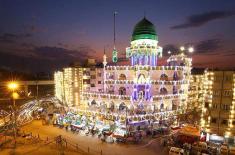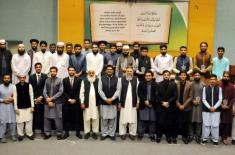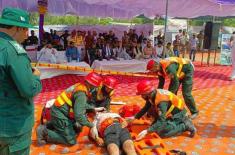
Flood Victims Await KP Govt Compensation As Winter Looms
Muhammad Irfan Published September 07, 2025 | 01:50 PM

PIRBABA Buner, (UrduPoint / Pakistan Point News - 7th Sep, 2025) As the final monsoon winds whisper through the pine-covered slopes of Buner and Swat districts, there’s a cold silence in the air, signaling the arrival of winter season.
It lingers like an unanswered prayer, broken only by the rustling of plastic sheets and the low murmur of families huddled in makeshift shelters. In these quiet hills, beauty and tragedy now share the same frame.
It’s been three weeks since the devastating floods of August 15 tore through this northern district of Khyber Pakhtunkhwa, but for thousands like Nabi Gul, the flood never truly ended.
“I used to have a home,” says Nabi Gul, a soft-spoken daily wage labourer from Pir Baba, standing barefoot on what was once his living room floor. “Now, I have a sheet of plastic and four children who often wake up because of the cold.”
His five-marla house—small by most standards, but built with years of sweat and sacrifice—was swallowed by flash floods in a matter of minutes. Everything he owned now fits in a corner of a muddy tarp, donated by a charity. The walls are gone. The dreams they sheltered are scattered in the debris.
Nabi Gul estimates he needs at least Rs three million to rebuild. But the assistance he was promised remains a distant mirage.
“We’re told help is coming,” he says, pointing to the local government office. “But we’ve been coming there every week. They just tell us to wait.”
Buner was not alone. Across KP, the floods killed over 500 people, flattened 598 homes, and damaged 2,971 more. Crops were lost. Schools crumbled. Entire villages vanished beneath the churning waters.
In Daggar, the district headquarters of Buner, the destruction runs deeper than broken walls. Livelihoods already fragile have been washed away.
“Our crops are gone. Our cattle are dead,” says Younas Khan, standing next to the remains of his grain store. “The ministers came, took pictures, handed us tents that barely stand in the wind, and left.”
It’s not just homes that are broken so is trust. Families speak of government promises that haven’t materialized, of digital apps that don’t work for the illiterate, and of compensation packages that are announced in press conferences but vanish in reality.
Khyber Pakhtunkhwa’s Information Adviser, Barrister Dr. Muhammad Ali Saif, maintains that the government is responding quickly to help flood victims.
Rs 664 million has been distributed to the families of 332 deceased and Rs 58 million went to owners of fully destroyed homes besides Rs 14.5 million to those with partial damage and Rs 15,000 in food aid per family was distributed via a mobile app.
But on the ground, residents say their Names might be on the lists, but their hands are still empty.
“There are signatures and stamps, but no money,” says Nabi Gul, frustration etched into his face. “Maybe the money is real, but it’s not reaching us.”
Only 43 households have received payments for destroyed homes so far less than 10% of those eligible.
Chief Minister Ali Amin Khan Gandapur recently held a video conference directing officials to expedite relief. He ordered Rs 5 billion released to the Provincial Disaster Management Authority (PDMA) and approved:
Besides Rs 100,000 per household for post-flood cleanup , compensation for shopkeepers as per pending damage assessments and inclusion of children of deceased without CNICs in the aid process.
But even as official machinery churns, time ticks away as winter approaches fast.
Winter is no longer a distant concern—it’s a coming threat, said Nabi Gul.
“We’re not asking for luxuries,” says Gul. “Just walls. Just blankets. Just food and clean drinking water for our children.”
The tragedy of Buner is not just in the loss of life or property. It’s in the erosion of dignity.
“This isn’t just about money,” says Nabi Gul. “It’s about feeling human. It’s about not having to beg for what you’ve been promised as your right.”
There is a fine line between resilience and despair. The people of Buner walk that line every day rebuilding homes with borrowed bricks, feeding children with borrowed food, and keeping warm with borrowed hope.
And yet, amid all this, they do not see themselves as victims.
“We’re not beggars,” says Nabi Gul, gently patting the head of his youngest son. “We are citizens. We’ve lost everything, yes. But don’t let us lose our belief in the system.”
As the sky darkens and the wind picks up once again over the hills of Buner, the plastic sheets flap like tattered flags in a forgotten war. A war not against nature, but against neglect.
The people wait not for sympathy, but for action. And with each cold night, that wait grows heavier in Buner and Swat.
Recent Stories

Currency Rate In Pakistan - Dollar, Euro, Pound, Riyal Rates On 7 September 2025

Today Gold Rate in Pakistan 07 September 2025

Currency Rate In Pakistan - Dollar, Euro, Pound, Riyal Rates On 6 September 2025

Today Gold Rate in Pakistan 06 September 2025

5.2 magnitude earthquake jolts Islamabad and surrounding areas

India’s water tactics violate international agreements: Adviser

Sahil Welfare, Pak Navy continue relief operations in flood affected areas

ADR rooted in our traditions, key to addressing court pendency: Justice Iqbal Ah ..

India weaponized water to trigger floods in Pakistan: Rana Sanaullah

NHA marks Eid Milad-un-Nabi (PBUH) with devotion & reverence

Seerat-un-Nabi (PBUH) great model to develop social justice, equality: Law Minis ..

Rescue 1122 continues relief operations in flood-hit Chenab river areas
More Stories From Pakistan
-
Capital Police Issues Rain Safety Advisory for Citizens
6 minutes ago -
Flood victims await KP Govt compensation as winter looms
6 minutes ago -
White Paper finds KP's elected LGs systematically stripped of power by parallel political structures
26 minutes ago -
DHO Hyderabad visits medical camps in Kucha areas
36 minutes ago -
Mohsin Naqvi pays glowing tribute to PAF heroes on Air Force Day
36 minutes ago -
Alkhidmat hands over five trucks relief goods to Afghan authorities at Torkham Border for earthquake ..
36 minutes ago
-
Nation pays tribute to PAF heroes on Air Force Day
46 minutes ago -
Five drown as rescue boat capsizes in Chenab River
46 minutes ago -
Swiss cyclists find ‘A Dream on Wheels’ in Pakistan’s valleys and mountains
56 minutes ago -
60th Defense Day celebrated at the Pakistani Consulate in Jeddah
56 minutes ago -
Capital Police nab two, seize over 1kg Ice
1 hour ago -
Five killed, 20 injured as passenger coach overturns in Nawabshah
1 hour ago